
We found this little beauty on a pallet on the manufacturing floor at work today. One of the guys said it was a brown recluse spider which is really, really nasty, but I looked here and am pretty sure it is not because it has “more than two pigments on its body.” Not sure what it is, maybe a wolf spider? They are poisonous, too, but maybe not as bad. At any rate, it was big and cool looking.
Category: Science Page 3 of 4
My buddy Andrew sent me a link that was so good, I have been saving it for a Friday to get the maximum impact. I do not think he will mind if I just paste it here cloth. Thank you Andrew, I have followed the twitter account and of course I am an avid fan of RetractionWatch.com–the site that tracks the people who get caught doing bad science.
I’m not sure who runs this Twitter account, so I’m not vouching for them, but they appear to post links to “peer-reviewed papers produced by the social sciences and humanities departments of western universities”… and their selections are simply ludicrous:https://twitter.com/RealPeerReview
Apparently there was a different Twitter account that preceded this one, but it was shut down. I think because the person running it was exposed or feared being exposed. Here are a couple of articles related to one paper on “feminist glaciology” that the previous Twitter account put a spotlight on:Knowing how you feel regarding certain fields of study in academia, I couldn’t resist sharing with you.Best,Andrew
Douglas Axe is a very bright guy. He wrote what I believe is a very insightful article about what amounts to be the priesthood of science thinks about mere mortals who do not do science for a living. He comments on a graduation address from a guy who gives advice to Cal Tech grades about how they might rebuild public confidence in that the scientific community. It is very interesting to me the guy does not have an academic doctors degree (he is an M.D.), nor even a masters degree in a scientific discipline. Beside being an M.D. and professor, it appears he is mostly a public policy guy who moonlights as a “contributor” at a pseudo-intellectual magazine in New York. With not a lot of scientific background nor close proximity to anything that is remotely like the general public in America, I am wondering how he thinks he might be qualified to talk on that subject. Maybe there is something not in the public record that gives him some knowledge that is not so apparent from the outside looking in.
Axe is a working scientist who is profoundly more qualified than the graduation speaker to talk about the scientific enterprise. He says some things that make one think he might have a much better grasp not only of science, but the caricature that much of the scientific culture of the day has become. The whole article is worth a read, but here is an excerpt from Axe speaking about his own graduation from Cal Tech back in 1990:
The “we” versus “they” stance that characterizes Gawande’s speech would have resonated with me then, I think. When he said, “People are prone to resist scientific claims when they clash with intuitive beliefs,” I would have understood the coded language. “People” here means mere people — those who haven’t been inducted into the superior scientific “way of being.” So, what are we scientists to do when those unenlightened outsiders don’t follow us? Using smaller words and speaking more slowly only goes so far, because “once an idea has got embedded and become widespread, it becomes very difficult to dig it out of people’s brains — especially when they do not trust scientific authorities.”
Yes, indeed. People tend to be wary of that kind of brain surgery.
Maybe the better way to restore public confidence is to abandon the condescending mindset and embrace a much more radically inclusive view of science. Maybe the moms Gawande referred to–the ones who jumped to the conclusion that vaccines were dangerous — aren’t all that different from professional scientists who jump to the conclusion that public dissent is dangerous. Gawande gave five handy tips for writing people off as pseudoscientists, but instead of alienating people by dismissing them in this way, what if we were to view public opinion as the ultimate form of peer review?
It appears the idea that right-brain people are more intuitive, thoughtful and subjective while left-brain people are more logical, analytical and objective is just wrong. It is a complete myth that came out of work performed by Robert Sperry, a Nobel prize winning neuropsycologist who got his undergraduate degree in English and his PhD in Zoology. I think Sperry probably did some pretty good work in his day, but we also got saddled with this left-brain/right-brain meme and a gazillion pop psychology books that are based on a premise that is almost completely misplaced. It seems like Neuropsychology might be a lot like Evolutionary Psychology and much of what passes for Neuroscience (see here and here) where it is OK to just make stuff up. At any rate, here is a great article on the subject from the Wall Street Journal. The following is an excerpt from another article titled Left Brain vs. Right Brain, Understanding the Myth of Left Brain and Right Brain Dominance:
In psychology, the theory is based on the lateralization of brain function. The brain contains two hemispheres that each performs a number of different roles. The two sides of the brain communicate with one another via corpus callosum.
The left hemisphere controls the muscles on the right side of the body while the right hemisphere controls those on the left. This is why damage to the left side of the brain, for example, might have an effect on the left side of the body.
So does one side of the brain control specific functions? Are people either left-brained or right-brained? Like many popular psychology myths, this one grew out of observations of the human brain that were then dramatically distorted and exaggerated.
I just finished a totally fascinating series of linked posts by and about a scholar from Rice University here in Texas on how difficult, impossible really, it is to make claims about abiogenesis based on the current state of human knowledge. Abiogenesis and the mind/brain problem are two of the greatest mysteries of our age. Honest people know that we do not know enough about either of them to even know how to to study them. I have written about the mind/brain problem on this blog in the past because it fascinates me. Here is one of my posts with links to articles that describe the mind/brain problem.
I have not really written that much about abiogenesis because it so far out of my areas of expertise. I have had a passing interest in the topic, but not enough skill or knowledge to talk about it coherently. Today, though, I ran into an article titled On Prebiotic Chemistry, Synthetic Chemist James Tour Urges an Admission of Ignorance that lead me to several other articles that provide what appears to be a pretty good overview of our current state of knowledge on the topic written on a level most laymen could understand. For giggles, you can see some of the cat fight that occurs when claims are made about this type of topic. I might note that Tour, who is about as good as it gets in describing difficult material to a lay audience, is not completely innocent of staying in his own domain–he makes a a statement about whether Intelligent Design falls within the realm of science, a question that could probably be best answered by someone who works in information theory and philosophy of science, which are well outside Tour’s area(s) of professional and scholarly expertise. That is a very minor quibble as the articles were fabulously interesting and informative. I list them below in the order I read them:
We had an interesting conversation about Intelligent Design on the way home from church today. Christian’s research is in the area of Information Theory. I tried to explain that the presence of information was only half of the Intelligent Design equation. The content of the information and its contingency are just as fundamental to Intelligent Design as Information Theory which says nothing about content or contingency. I found a great article by William Dembski titled Intelligent Design as a Theory of Information that describes these concepts in terms that laymen can understand. Dembski starts the discussion of what he calls complex, specified information like this:
Given a means of measuring information and determining its complexity, we turn now to the distinction between specified and unspecified information. This is a vast topic whose full elucidation is beyond the scope of this paper (the details can be found in my monograph The Design Inference). Nonetheless, in what follows I shall try to make this distinction intelligible, and offer some hints on how to make it rigorous. For an intuitive grasp of the difference between specified and unspecified information, consider the following example. Suppose an archer stands 50 meters from a large blank wall with bow and arrow in hand. The wall, let us say, is sufficiently large that the archer cannot help but hit it. Consider now two alternative scenarios. In the first scenario the archer simply shoots at the wall. In the second scenario the archer first paints a target on the wall, and then shoots at the wall, squarely hitting the target’s bull’s-eye. Let us suppose that in both scenarios where the arrow lands is identical. In both scenarios the arrow might have landed anywhere on the wall. What’s more, any place where it might land is highly improbable. It follows that in both scenarios highly complex information is actualized. Yet the conclusions we draw from these scenarios are very different. In the first scenario we can conclude absolutely nothing about the archer’s ability as an archer, whereas in the second scenario we have evidence of the archer’s skill.
He goes on to extend the scenario to an archer who shoot an arrow at a blank white wall, then paints a target around it post hoc and why the information content of that scenario does not meet the criteria for complex, specified information. Dembski, who holds a PhD in Mathematics from University of Chicago has spent a good chunk of his career adding rigor (in the mathematical sense) to this proposition. No one has refuted him in any meaningful way although you can not tell that from what it says about Intelligent Design from its Wikipedia article nor other such agenda driven outlets. The article is pretty long but well worth the read for people on both sides of the Intelligent Design divide.
Betty Blonde #452 – 04/11/2010
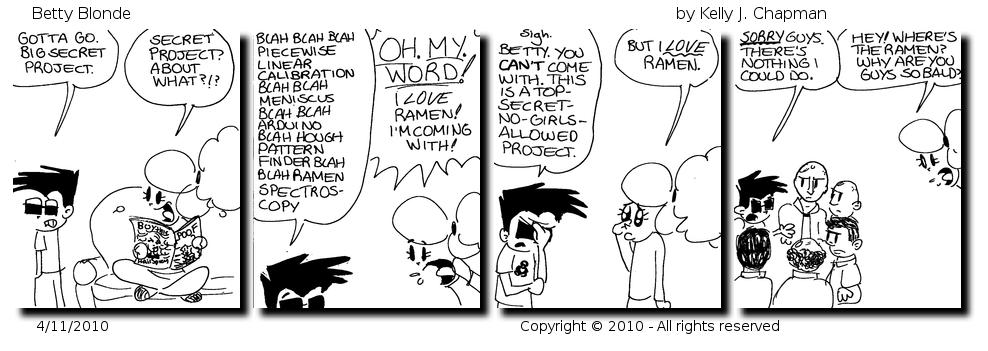
Click here or on the image to see full size strip.
There is a very vigorous conversation that is occurring right now in the world of “science.” I put the word science in scare quotes because the very thing under discussion is whether much of the research performed in Physics today could actually be called science. A long and very interesting article in Quanta Magazine titled A Fight for the Soul of Science starts out like this:
String theory, the multiverse and other ideas of modern physics are potentially untestable. At a historic meeting in Munich, scientists and philosophers asked: should we trust them anyway?
It has always been my understanding that if something is not testable or falsifiable in Popperian sense, it did not mean that that something could not lead to truth. It did mean, however, that that something could not be defined as science. Now, a group of scientist want to morph the definition of science to include untestable theories such as String Theory. A conference was held to discuss the issue and that is what this article is about. For those interested in this question, it is a very interesting article. I read through it once last night, but plan to read through it more carefully over the holidays. I am not sure what I think about this, but it is an emotional and important issue for people her earn their living in Physics research.
Betty Blonde #446 – 04/01/2010
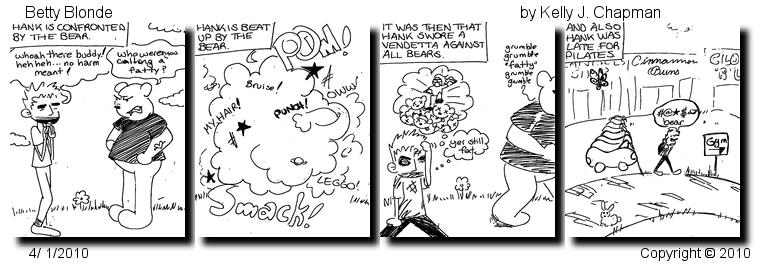
Click here or on the image to see full size strip.
In 1994 a secular guy named David Chalmers, then at University of Arizona, got famous because he characterized something that had been known and discussed for centuries. He described a problem James Trefil, a Physics professor at George Mason University described this way:
It is the only major question in the sciences that we don’t even know how to ask.
In a couple of papers, he described why the mind-brain (spirit) problem is no where close to being answered in any meaningful way. There is nothing religious in this article nor is David Chalmers friendly in any way toward Christianity–he is an atheist. Much deeper thinkers than he had said this same thing year after year for many years, but for some reason, he got famous for it. Here are his articles and a lengthy 2015 article on the subject in the Guardian.
- The Hard Problem (1994)
- Consciousness and It’s Place in Nature (2003)
- An article from 2015 on why there had been virtually no progress on the problem even though we know a lot more about the brain (what part of the game attracts us to gambling, the part of the brain that causes different kinds of problems, etc.
- They even did a TED talk on this thing.
I even wrote about it in my blog.
It caused an uproar in the psychology, philosophy and neuroscience worlds, maybe because he did such a good job of describing the problem. People have been trying to find ways to work on it much more aggressively ever since. I say they have been trying to find ways to work on it because they are not really working on the problem itself because it is not amenable to science. They are just trying to figure out a way to work on it.
This is all interesting stuff.
Betty Blonde #430 – 03/10/2010
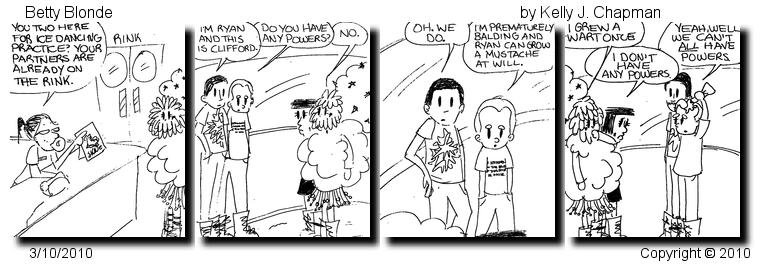
Click here or on the image to see full size strip.
 Christian gave his paper at the Asilomar Conference on Signals, Systems and Computers in Pacific Grove California yesterday. It was a scary deal being the first time he has done it, but it went well. Now all he has to do is enjoy the rest of his conference, visit a buddy at UCLA on the way home and get ready to go on to the next thing.
Christian gave his paper at the Asilomar Conference on Signals, Systems and Computers in Pacific Grove California yesterday. It was a scary deal being the first time he has done it, but it went well. Now all he has to do is enjoy the rest of his conference, visit a buddy at UCLA on the way home and get ready to go on to the next thing.
The picture at the left is one I took after church when we ate lunch at Boston Market in Cupertino before Christian dropped me off at the airport to fly home to Oregon. We had a great time. It was especially good to be “stuck” in a car for twelve hours or so just to talk stuff over. This is a trip we will remember.
Betty Blonde #420 – 02/24/2010
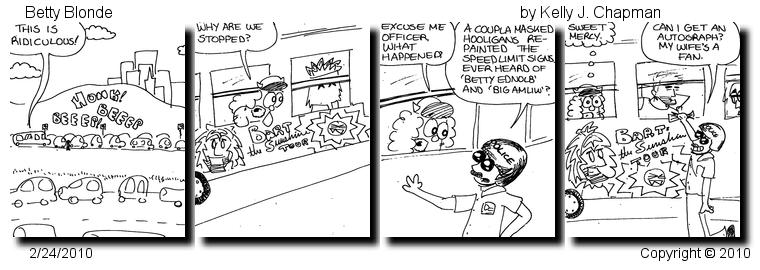
Click here or on the image to see full size strip.
 An amazing thing happened yesterday. One of the managers at my work won a $5 Starbucks gift certificate for getting a correct answer on a safety question. In a classy move, he did a “guess the number” raffle with his team. About seven people participated. The number was 43. Two of the guessers got it right. We were pretty sure no one cheated. I was one of the guessers how picked 43. I picked it because 42 is the answer in Hitchhiker’s Guide to the Galaxy and I hate that pretentious, badly written tome so I one upped it to 43. What are the odds? My immediate thought is that my picking 43 was definitely not random. Actually, whether the reason for picking 43 was overt or subliminal, I am pretty confident the other two who picked it (the raffle organizer and the other guesser) did not pick it randomly either. But then what could be the cause?
An amazing thing happened yesterday. One of the managers at my work won a $5 Starbucks gift certificate for getting a correct answer on a safety question. In a classy move, he did a “guess the number” raffle with his team. About seven people participated. The number was 43. Two of the guessers got it right. We were pretty sure no one cheated. I was one of the guessers how picked 43. I picked it because 42 is the answer in Hitchhiker’s Guide to the Galaxy and I hate that pretentious, badly written tome so I one upped it to 43. What are the odds? My immediate thought is that my picking 43 was definitely not random. Actually, whether the reason for picking 43 was overt or subliminal, I am pretty confident the other two who picked it (the raffle organizer and the other guesser) did not pick it randomly either. But then what could be the cause?
Betty Blonde #393 – 01/18/2010

Click here or on the image to see full size strip.
Previously I wrote about the problem of consciousness. I was reminded of that post when I read this article in Scientific America where John Horgan interviews physicist Lee Smolin. Here is an interchange I found interesting:
Horgan: Roger Penrose has suggested that a unified theory might also help solve the problem of consciousness. Do you agree?
Smolin: Roger is a deep and original thinker, who stands head and shoulders above almost everyone now living in the lasting importance of his thought and insights. Nonetheless, in this one regard I suspect he is overstepping the limits of present science. He is absolutely right that consciousness is real and that its role in nature is a physics problem. But I suspect physics needs to progress a lot more before we will have the vocabulary to frame useful hypotheses about consciousness.
Horgan: Does neuroscience offer a better future than physics for bright would-be scientists?
Smolin: Neurosciences are a fabulous area to work in, ripe for great discoveries. I’ve always felt this and indeed the only alternative to a career in physics that ever attracted me was a brief flirtation in college with neuroscience. But that is a field which is as bedeviled by outdated metaphysical baggage as physics is. In particular, the antiquated idea that any physical system that responds to and processes information is isomorphic to a digital programmable computer is holding back progress.
Physics is also ripe for great discoveries. The best advice I would give to would be scientists is to do what you most love, make sure you master the tools and technicalities and then try to get to that hot zone where you are in equal parts a rebel and a conservative.
In the middle of a quite interesting article, Smolin suggests that physics has something to say about the hard problem of consciousness that is, at its core and by its nature, subjective. And I truly believe that the neurosciences are going to have to purge themselves of those who tell just so stories (Here is one example, but there are many more. Google it.) before serious people will take them, well, seriously.
Betty Blonde #235 – 06/10/2009
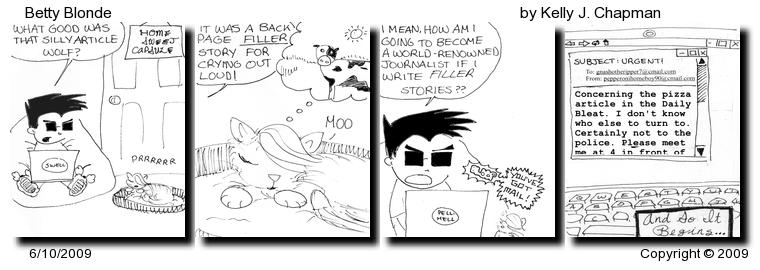
Click here or on the image to see full size strip.
An article titled Is School Overrated? High School “Dropout” Makes Affordable 3D Printer in Forbes got me to thinking about a vigorous discussion we have at my work on a fairly regular basis. We are (currently) an intellectual property company made up mostly of engineers and scientists. It is fascinating the technical/professional divide in the company, and it is a pretty big divide, is not your standard scientist vs. engineer divide. Everyone kind of agrees the divide is between those who “work from first principles” and use intuition and those who take a more empirical approach, performing a few experiments and take some measurements before choosing a path to make improvements and innovations. Of course, both groups follow both paths to a certain extent, but the intuitionists (if that is a word) tend to start with a single approach then tinker and tinker until something works while the scientists tend to identify the theoretical possibilities and plan experiments to figure out which one is best and to identify unknown problems.
Virtually everyone on the team that does invention has at least a Masters degree and most have PhD’s. We all, pretty much, get the math in the areas in which we work. It would be my contention that people with formal education in the science can become good tinkerers AND good scientists while those who do not have the formal education at a high level struggle when it comes to science and tend to relegate themselves to tinkering. People who want to learn undergraduate level math can do that without ever going to college through use of things like Khan Academy and other online tools. It is possible to get additional, graduate level math skills out of books, but it gets much harder. To be an Olympic class judo player, one needs to practice with other Olympic class judo players and train under Olympic class coaches.
I think we need both scientists and tinkerers, but as our understanding of physics, chemistry, biology and other highly technical areas of science gets more complex, it will be harder to compete without engagement with the best thinkers in any given field. The example above is about someone who is finding innovative ways to combine and use technology that has already been invented. Inventing something new requires much deeper knowledge than the skills required to create the things described in the article. The “maker” in the article is working with people from MIT who have deep technical skills and formal knowledge, so maybe he will someday move from tinkering to science.
Betty Blonde #205 – 04/29/2009
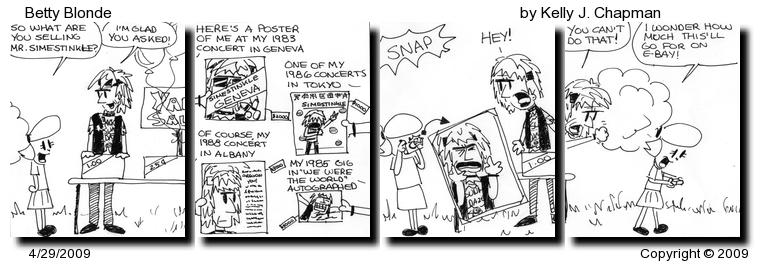
Click here or on the image to see full size strip.
I love the way the Discovery Institute’s Evolution News and Views blog takes down new artificial intelligence hype from the pop-science New Scientist’s website. The post is titled Is Google a Step Away from Developing a Computer that Can “Program Itself”?. The New Scientist article in question is sensationalistically titled Computer with human-like learning will program itself. In the introduction to the ENV post, author, Erik J. Larson says:
“Human-level learning” and “self-programming” (more generally: self-replication) are central memes in the latest Sci-Fi fad hyping smart machines becoming smarter and smarter, imminently overtaking mere humans. But, predictably, the scientific merit of the purported “breakthroughs” is paltry at best. Notwithstanding the fad and the hype, there’s, well, no news here.
It kind of gives one pause (again) about a lot of the stuff reported in New Scientist.
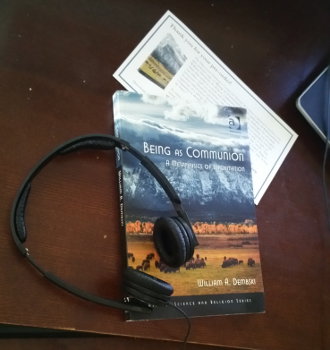 I pre-ordered William Dembski’s new book, Being as Communion: A Metaphysics of Information a few weeks back and it arrived today. I am really looking forward to reading it but I am still only part way into John R. Pierce’s Introduction to Information Theory: Symbols, Signals and Noise. Christian convinced me to read the Pierce book so I could have a better background to understand the Dembski book. I love the quote that came on the “Thank you for your pre-order!” card. Part of it says:
I pre-ordered William Dembski’s new book, Being as Communion: A Metaphysics of Information a few weeks back and it arrived today. I am really looking forward to reading it but I am still only part way into John R. Pierce’s Introduction to Information Theory: Symbols, Signals and Noise. Christian convinced me to read the Pierce book so I could have a better background to understand the Dembski book. I love the quote that came on the “Thank you for your pre-order!” card. Part of it says:
In Being as Communion, Dr. Dembski challenges the oft-made claim that mind is a myth and that everything about us–including our thoughts, our ethics, and our decisions–are ultimately the products of unguided material processes. Dembski provocatively argues that the opposite is true: In light of modern information theory, it is materialism, not mind that is “myth.”
With Christian taking his first graduate level class in Information Theory next semester, I had better pick up the pace or I will be left far behind.
Betty Blonde #198 – 04/20/2009
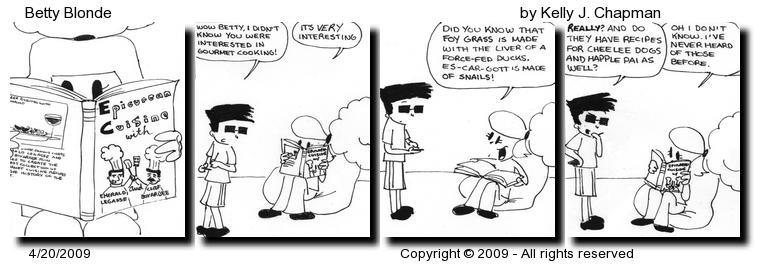
Click here or on the image to see full size strip.
It seems like every time one turns around, another neuroscientist has conflated mind and brain. Michael Egnor at the Discovery Institute blog does a great service by calling out the neuroscientific silliness in a NY Times essay by Princeton neuroscientist Michael Graziano. Egnor’s post titled “Are We Really Conscious?”: A Reply to Dr. Graziano’s Brain is a follow-up to Wesley Smith’s post titled Big-Brained Scientist Says We Aren’t Conscious on the same subject. Egnor points out the conflation to Graziano with impressive clarity in his post. He is a skilled neurosurgeon who knows that about which he writes. Here is an excerpt:
The brain’s visual system consists of neurons, axons, dendrites, neurotransmitters, and the like. Protoplasm. Protoplasm doesn’t make faulty assumptions, and brains don’t reconstruct anything. People make faulty assumptions, and people reconstruct things. It may well be that there are aspects of the brain’s visual system that contribute to our faulty assumptions and to our reconstructions, just as there are aspects of my computer monitor (a smudge) that may contribute to my misunderstanding a word printed on the screen. But my smudged computer monitor didn’t misunderstand the word. My computer monitor has no psychological attributes at all. I misunderstand words. Only people misunderstand.
An apt analogy is the relation of the stomach to eating. Our stomach plays an important role when we eat, but we eat. Our stomachs don’t eat.
We urinate. Our kidneys don’t urinate.
We dance. Our feet don’t dance.
Dr. Graziano commits the mereological fallacy — he mistakes attributes of the whole for attributes of the parts. Our organs do things appropriate to them — our brain has action potentials and secretions of neurotransmitters and blood flow and the like. But our brain assumes nothing and reconstructs nothing. We — not our brain — assume and reconstruct.
Read the whole thing. I can highly recommend Wesley Smith’s article, too.
Betty Blonde #189 – 04/07/2009

Click here or on the image to see full size strip.
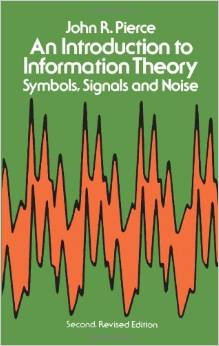 I usually wimp out when it comes to learning hard mathematical stuff like what is required to have a working understanding of Information Theory. In this case, though, I am glad I let Christian convince me to give it a shot because it appears to be fundamental to things like how the brain works, intelligent design, statistical inference, cryptography, quantum computing and a ton of other stuff related to my work and/or are my avocational interests. I looked around for a decent introductory book that did not get so bogged down in the math that the big picture did not emerge. John R. Pierce’s book An Introduction to Information Theory: Symbols, Signals and Noise seemed to be an almost universal choice to meet this criteria.
I usually wimp out when it comes to learning hard mathematical stuff like what is required to have a working understanding of Information Theory. In this case, though, I am glad I let Christian convince me to give it a shot because it appears to be fundamental to things like how the brain works, intelligent design, statistical inference, cryptography, quantum computing and a ton of other stuff related to my work and/or are my avocational interests. I looked around for a decent introductory book that did not get so bogged down in the math that the big picture did not emerge. John R. Pierce’s book An Introduction to Information Theory: Symbols, Signals and Noise seemed to be an almost universal choice to meet this criteria.
I am half way through the first chapter of the book. It has become abundantly clear that a full understanding of Information Theory is not really possible without an engagement with the math at a deep level. Nevertheless, a review at Amazon made the following observation about the book that makes me think I am on the right path. I might need to read one or more additional books to arrive at the working understanding I want, but this will definitely get me started at a level that does not discourage me from taking the next steps. Here is an excerpt from the review:
The book is geared towards non-mathematicians, but it is not just a tour. Pierce tackles the main ideas just not all the techniques and special cases. Perfect for: anyone in science, linguistics, or engineering.
Another thing that is abundantly clear is that Christian, in his current position with his current major professor and research sponsor, has an exceptional opportunity to get a strong grounding in the area of Information Theory and that such a grounding will serve him very well whether in whatever technical research pursuit he chooses when he finishes this degree. His first research project is the solution of a difficult problem that engages specifically with the material about which I am reading, but with mathematical rigor beyond the scope of the book.
If the material is not too tedious for a general blog like this, I plan to write about it more because it is so interesting. I am early in the book and engaged with topic of entropy as it is used in the field of Information Theory. Entropy has a very specific definition in this context and is different from entropy as that word is used in thermodynamics or statistical mechanics. The bigger deal for me is that I can see it has important ramifications for even the work I do in my day job.
Betty Blonde #183 – 03/30/2009

Click here or on the image to see full size strip.
Luke, over at the Sonlight blog is on somewhat of a roll, both in what he is writing and what he is linking in his Other posts of note list. He went away for a week on a road trip and now I have several new blog posts that need to be written based on his stuff. Especially surprising was a link to an article on a humanist pop-scientist named Steven Pinker. Steven Pinker regularly says ridiculous things about science and is just as regularly slapped down by people with deeper understanding of the things on which he pontificates. That being said, the last line in the article about Pinker caught my attention and actually makes me want to read his book. It says,
Scholars who argue for the beauty of language over the correctness of it always win my heart.
To my way of thinking, that is high praise. New York Magazine wrote an article about all this titled Steven Pinker on Why It’s Okay to Dangle Your Participle. It is quite a good interview article and I recommend it in spite of the venue. Steven Pinker, amazingly, has a coherent idea or two, at least on the topic of writing.
Maybe Luke should try to go away for a week more often. Week long road trips are awesome for those taking them and, under the right circumstances, very educational for those stuck at home.
 The chief scientist at my current job is a really nice guy named Tom Cornsweet who has spent a very long career studying human vision and developing tools to measure and analyze it. You can see his Wikipedia page here and a visual effect named after him called the Cornsweet Illusion here. A couple of days ago he lent me the seminal text book he wrote titled Visual Perception. The copyright date was 1970 and Tom says that, of course, technology and understanding have moved on since then, but it still provides a pretty good description of what we know about how people see. I am really looking forward to reading it.
The chief scientist at my current job is a really nice guy named Tom Cornsweet who has spent a very long career studying human vision and developing tools to measure and analyze it. You can see his Wikipedia page here and a visual effect named after him called the Cornsweet Illusion here. A couple of days ago he lent me the seminal text book he wrote titled Visual Perception. The copyright date was 1970 and Tom says that, of course, technology and understanding have moved on since then, but it still provides a pretty good description of what we know about how people see. I am really looking forward to reading it. 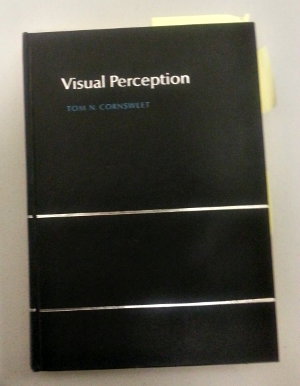 I work closely with Tom as part of a team that is implementing his “vision” of an instrument to help ophthalmologists and optometrists do their work better. It is a joy to work with him and I am learning a lot about how humans do the things I have spent my career trying to do inside computers.
I work closely with Tom as part of a team that is implementing his “vision” of an instrument to help ophthalmologists and optometrists do their work better. It is a joy to work with him and I am learning a lot about how humans do the things I have spent my career trying to do inside computers.
Betty Blonde #173 – 03/16/2009
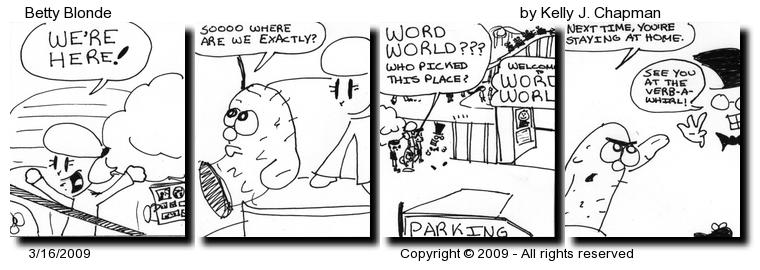
Click here or on the image to see full size strip.
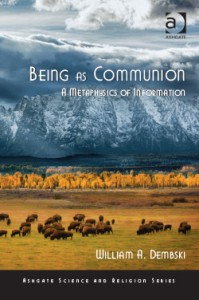 Several years ago, I described a theory to the kids that makes the proposition that the smaller the things we are able to see the more it looks like that matter is really just thought. That is, the closer we look into what makes up electrons, neutrons, protons, and other subatomic particles the more that it looks like there is not substance to the substance of matter. I am not really sure whether that is something I just read in the cheesy science fiction novels that I voraciously read starting back in the late sixties and running into the nineties.
Several years ago, I described a theory to the kids that makes the proposition that the smaller the things we are able to see the more it looks like that matter is really just thought. That is, the closer we look into what makes up electrons, neutrons, protons, and other subatomic particles the more that it looks like there is not substance to the substance of matter. I am not really sure whether that is something I just read in the cheesy science fiction novels that I voraciously read starting back in the late sixties and running into the nineties.
Now, it turns out that there might have been some truth to the speculative stories I told to the kids. In William Dembski’s third scholarly monograph, Being as Communion, he makes a strong case for the idea that the information and not matter is the fundamental substance of reality from which everything is made. Dembski is highly qualified to make this case. He has earned PhD’s in Mathematics from the University of Chicago and Philosophy from the University of Illinois Urbana-Champaign and has spent his life investigating the role of information and design in God’s creation from the perspectives of both science and philosophy.
His first two books, The Design Inference, and No Free Lunch laid the ground work for this third very important work that makes the case that information that must have come from an intelligent designer is required for all things material and life in particular to exist. From the pre-release reviews, it appears that some of the mathematics in the book are not for the faint of heart, but the book as a whole is tractable in the sense that a layman can get the big picture. That being said, the laymen might be best served to just skim the deep math that gives the minutiae that makes the technical case.
I have ordered the book and plan to review it here after I have taken the time to read through it.
Betty Blonde #171 – 03/12/2009
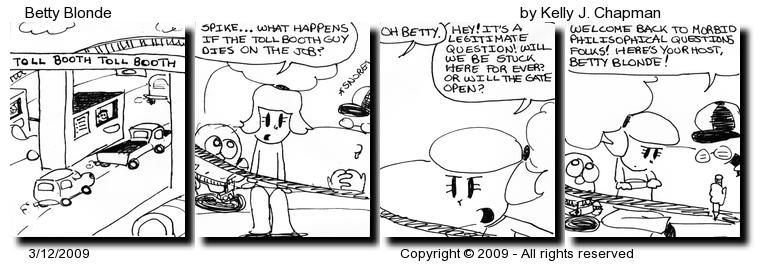
Click here or on the image to see full size strip.
I have never been much of a fan of Mark Twain, but he came up with a pithy quote now and again. One of my favorites is apropos to a large category of pontifications emanating from celebrity “scientist” Neil deGrasse Tyson.
The trouble with the world is not that people know too little, but that they know so many things that ain’t so.
It is easy to be irritated by Tyson and not just because his style is so grating. Last week, Sean Davis over at the Federalist website calls out Tyson in a couple of articles titled Super Scientist Neil deGrasse Tyson Doesn’t Understand Statistics and Did Neil deGrasse Tyson Just Try to Justify Blatant Quote Fabrication? I especially liked the header text on the first article, “Bro, Do You Even Science?” and the subtitle on the second, “If Neil deGrasse Tyson is an honest broker, why do the facts in his stories keep changing.” These are a great pair of articles and I recommend you read them both. Here is a quote that captures their flavor (go to the original article to access the links in the quote):
So, contrary to what Tyson claimed about how nuanced and subtle and unique and contextual his presentation last week was, we have evidence that he’s been recycling the same tired trope and same non-existent quotes for years. Like this one, or this one, or this one, or this one, or this one, or this one, or this one. The most baffling aspect of the whole thing, though, is why he feels the need to manufacture proof of how journalists and politicians are bad at math. Of course they’re bad at math. Of course they’re not very bright at a whole host of things.
Proving that water is wet, however, should not be this difficult. All you need to do to prove that politicians are stupid is pay attention. Or, if that’s too hard, you can spend 5 seconds on Google. Likely fewer if you know what you’re doing.
Neil deGrasse Tyson’s participation in the Cosmos television series is bad enough that the Discovery Institute has felt compelled to engage with his prevarications or misrememberings or whatever they are. They started with a series of articles, but it has gotten so bad they have decided to write a book. It is really that bad and, based on history, this new Cosmos will most probably make it into the government school system just like the old one. This is another great reason to homeschool.
Betty Blonde #167 – 03/06/2009
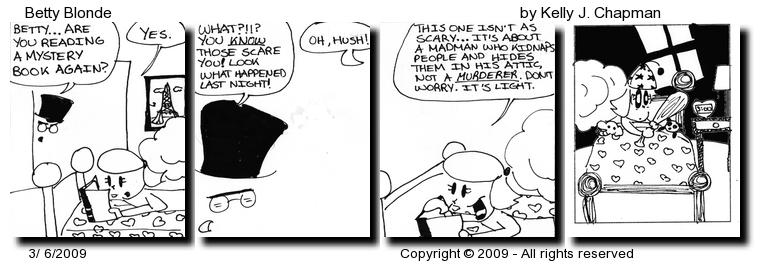
Click here or on the image to see full size strip.
